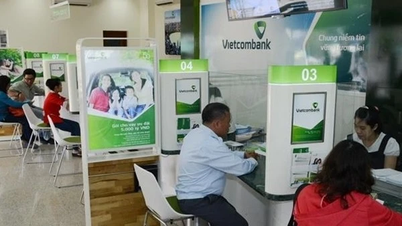Businesses thirsty for capital, banks cautious
Mr. Nguyen Kim Hung - Chairman of the Board of Directors of Kim Nam Group - shared that there are currently many technology enterprises owning software products with high commercial value.
However, these digital assets are not recognized by banks as collateral, making it difficult for businesses to access loans. Many businesses also want to issue tokens to raise global capital, but this plan has not been implemented due to unclear legal corridors. Meanwhile, the global digital technology race is accelerating.
“We expect the authorities to soon issue regulations on identification and valuation of digital assets. Only then will businesses have the opportunity to access bank capital to invest in production and business in the short, medium and long term. If this bottleneck is removed, capital from banks will flow more strongly into the small and medium enterprise sector,” Mr. Hung suggested.
According to experts, the Draft Law on Digital Technology Industry has initially developed the concept of digital assets and ownership of these assets - an important step that paves the way for future secured transactions. Dr. Le Thi Giang ( Hanoi Law University) commented: "This is a premise to gradually perfect the legal framework, helping digital assets become an effective capital mobilization tool."
Experts say Vietnam should consider developing a separate law or decree on digital assets, which clearly defines the responsibilities of parties such as issuers, exchanges, and investors, while tightening licensing requirements and monitoring mechanisms to prevent money laundering and terrorist financing. Digital asset exchanges also need to register and be subject to the management of authorities.
As a short-term solution, it is possible to consider issuing a sandbox mechanism - allowing some banks or financial institutions to pilot lending with digital assets for a period of 3 - 5 years.
This will enable appropriate policy assessment and adjustment, ensuring a balance between technological innovation and risk control. The pilot phase should prioritize highly liquid digital assets, and consider establishing a specialized agency to supervise the digital asset market, to ensure compliance with capital, risk management and anti-money laundering regulations.
Lawyer Truong Thanh Duc - Director of ANVI Law Firm - said that in theory, assets can be mortgaged if they meet two conditions: ownership and not prohibited from trading. Cryptocurrencies meet these two conditions, so they can completely become collateral. However, in reality, no bank accepts this type of asset because the risk is too great and it is still outside the legal framework directed by the State Bank.
“Accepting collateral is to minimize risks. But if the asset itself contains many risks, the bank’s caution is understandable,” Mr. Duc stated his opinion.

Piloting is possible, but only suitable for investment funds
Mr. Giacomo Merello - Chairman of the Antigua and Barbuda Digital Asset Business Promotion Council, and Special Economic Envoy of the Prime Minister of Antigua and Barbuda in Singapore - said that currently, a number of countries in the world have allowed the use of digital assets, including cryptocurrencies, as collateral at banks.
For example, Singapore has recognized stablecoins as legal assets. In Switzerland, banks are also allowed to provide loans backed by cryptocurrencies, but this form is mainly applied to investment funds and large businesses, not popular with small individuals.
According to Mr. Merello, accepting cryptocurrencies as collateral is currently only implemented at a few digital banks – mostly small or medium-sized banks – and only for customers with strong financial potential. Meanwhile, large-scale traditional commercial banks are still cautious and not interested in adding digital assets to their collateral portfolio. In Vietnam, the ability of banks to participate in this field is still very limited.
Recently, when answering shareholders about the possibility of participating in building a digital asset trading floor - a draft being studied by the Ministry of Finance - BIDV Bank's leaders affirmed that, as a domestic commercial bank, BIDV is ready to coordinate with management agencies for implementation.
However, BIDV will not establish a separate company to operate this exchange due to the large capital requirements, complex technology and many related factors. Instead, the bank will participate in the market as a provider of payment services and other supporting services. The construction and operation of the exchange, according to BIDV leaders, will be more suitable for the private sector.
The banking system's caution towards digital assets - especially cryptocurrencies - is understandable in the context of this market's volatility and lack of clear legal corridors.
However, according to experts, with the rapid growth of digital assets, Vietnam still needs to soon complete the legal framework to effectively manage this field. Depending on risk appetite, each bank can choose the appropriate level of participation.
Lawyer Vu Van Tinh - Director of Salus Law Firm LLC - proposed adding the definition of "digital assets" to the Civil Code, and at the same time issuing a separate law or decree on this type of asset.
In addition, he recommended building a sandbox mechanism, allowing a number of banks or financial institutions to pilot the implementation of digital asset mortgage loans for a period of 3-5 years to assess effectiveness and risks before expanding the implementation on a large scale.
Source: https://baodaknong.vn/ngan-hang-loay-hoay-truoc-bai-toan-tai-san-so-va-tien-ma-hoa-251963.html


![[PHOTO] Hanoi fences off demolition of "Shark Jaws" building](https://vphoto.vietnam.vn/thumb/1200x675/vietnam/resource/IMAGE/2025/5/25/1b42fe53b9574eb88f9eafd9642b5b45)



![[Photo] Welcoming ceremony for Prime Minister Pham Minh Chinh and his wife on an official visit to Malaysia](https://vphoto.vietnam.vn/thumb/1200x675/vietnam/resource/IMAGE/2025/5/25/dc30203c3ae24da3990266ec3b29bb2d)
![[Photo] Funeral of former President Tran Duc Luong in Quang Ngai](https://vphoto.vietnam.vn/thumb/1200x675/vietnam/resource/IMAGE/2025/5/25/ccf19a3d8ea7450bb9afe81731b80995)





















![[Photo] Ea Yieng commune settlement project abandoned](https://vphoto.vietnam.vn/thumb/1200x675/vietnam/resource/IMAGE/2025/5/25/57a8177361c24ee9885b5de1b9990b0e)




























































Comment (0)